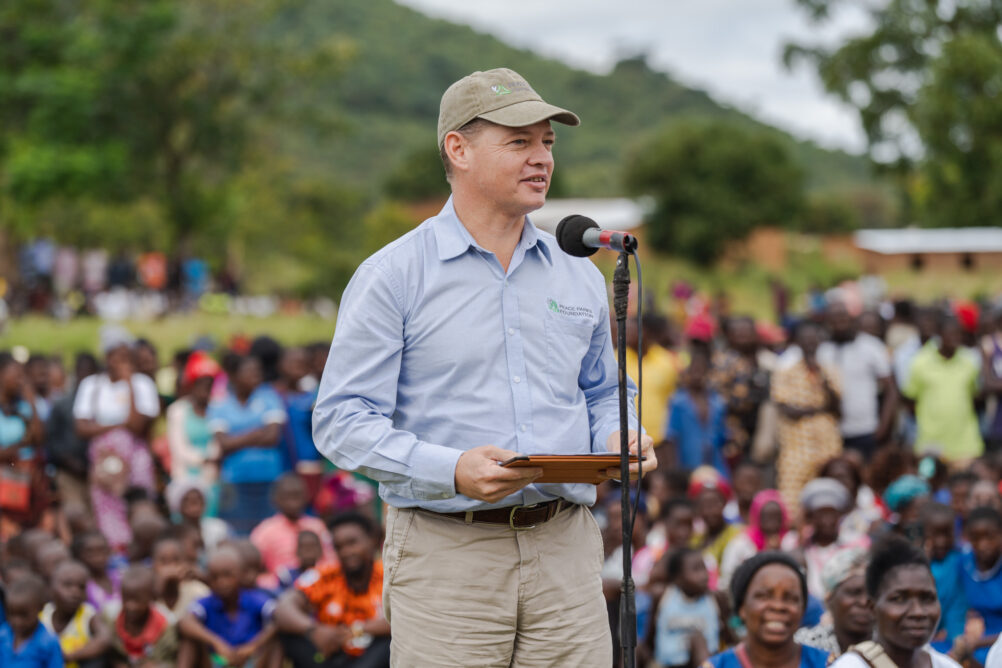Blog by Werner Myburgh, Peace Parks Foundation CEO
Conservation areas have a lot to offer to the people living in remote landscapes. They have the potential to offer healthy food, clean water, fresh air and jobs in nature-based tourism. Yet these fruits of joint conservation efforts are not always immediately realised.
With this in mind, the Government of Malawi and Peace Parks Foundation designed the Nyika Vwaza Co-Management Trust to govern Nyika National Park and Vwaza Marsh Wildlife Reserve in a more inclusive manner. We wanted to involve local communities living alongside these parks, to understand their livelihood challenges and create a peaceful coexistence of people and nature.
One of the biggest needs identified for the 60,000 people living within 5 kilometres of the park’s boundaries was safe and potable drinking water. Many only had access to brackish sources, while those who ventured inside the protected areas to draw from rivers and streams put their lives at risk through encounters with crocodiles, hippos and elephants.

From these conversations, the Nyika Vwaza Gravity-Fed Potable Water Supply Scheme was born, and construction began nearly two years ago with the support of the Government of Germany through KfW. The idea was to tap Runyina River in Nyika and channel water using gravity down to two communities that raised the lack of potable water as their biggest concern.
When the taps are opened by mid-2025, the first phase will deliver safe drinking water to 18,000 people. Over the next ten years the scheme will expand to reach 33,000 people using just one water supply line from the park to the surrounding communities. With additional support, other gravity-fed water schemes can be placed elsewhere within the park, servicing a lot more people.
I have learned interesting insights from the villagers during this project. The first came from the local people themselves when we offered to supply them with water from the park. For each section of the pipeline, which is 120 kilometres long, local water management committees decided to collect a nominal fee from water users. They believe people will respect the system if they pay for the water, and the committee will use the fees to maintain the supply.

The second insight came from a water management committee chairwoman who promised to ensure that no further poaching would take place in the park. Her committee motivates that if Nyika and Vwaza functions well, they will continue to benefit from its water.
The third was raised by a local Member of Parliament speaking at the scheme’s groundbreaking ceremony about Nyika’s susceptibility to fires. On Nyika’s high-rainfall plateau, the valleys have peatlands that act like a sponge, filtering the water and feeding it to the surrounding landscape throughout the year. This constant flow of clean water is under threat from wildfires that burn into the peat and destroy it, which means that when it rains, flash floods and massive soil erosion lead to mudslides and muddy water. The MP promised to put a stop to the grass fires lit on the plateau for years by locals poaching wildlife that are attracted to the new green shoots, or lighting fires to misdirect the rangers on patrol. The added benefit, of course, is that massive amounts of carbon will no longer be released into the atmosphere if an early burn programme is implemented and hotfires are limited.

These are fundamental shifts. The fresh supply of water to communities has created a system of self-regulation, where the local people start working with the park to identify poachers and warn of imminent poaching. The communities are taking the park’s side because they now have access to safe drinking water much closer to their homes, which they can collect without fear of encountering dangerous wildlife or picking up diseases from dirty water. It shows that when nature has real, tangible benefits for people, they will protect it.
And going hand in hand with community development is good governance of protected areas. The Nyika Vwaza Co-management Trust offers hope in a form of management that includes local stakeholders. For years, the management of protected areas has kept local communities on the other side of the fence where they gained no benefits.

For Nyika and Vwaza, the Malawi Government and Peace Parks brought on board traditional and local authorities, as well as private sector partners, at a strategic governance level. Fifteen trustees provide oversight and will also include the views of the entire community, providing guidance to the park’s management team, selected from among the best professionals in the country to ensure professionalism, accountability and transparency.
I believe this is the future of protected area management. My hope is that we will make a success of this model of inclusivity without compromising on professional protected area management, and that we can scale and replicate it as world-class protected area governance approach. Because the one cannot exist without the other – and Nyika Vwaza is an experiment to prove it.
For this, I give my heartfelt thanks to the German Federal Ministry for Economic Co-operation and Development and KfW for their unwavering and generous support. Together, we will make wildlife habitats valuable to people so that peaceful co-existence becomes the norm, rather than the exception.





